This paper reviews literature on passively transferred maternal antibodies against measles in infants. The amount and decay of these antibodies can be a result of changing patterns in society: increasing cohorts of women are vaccinated against measles instead of having naturally acquired immunity, the age of first childbirth is increasing and young adults are less exposed to natural boosters.
The concentration and persistence of maternal antibodies differ in infants of women vaccinated against measles versus infants of naturally immune women. The date for commencing universal measles vaccination should take into account the presence of these antibodies since they can hamper the immunological response to vaccination. Each country should therefore consider adapting the timing of vaccination in relation to its measles sero-epidemiological situation. The possibility of priming the immune system with an early vaccine dose and boosting later on offers opportunities for vaccination at very young age.
Vaccine, Volume 25, Issue 34, 21 August 2007, Pages 6296–6304.

